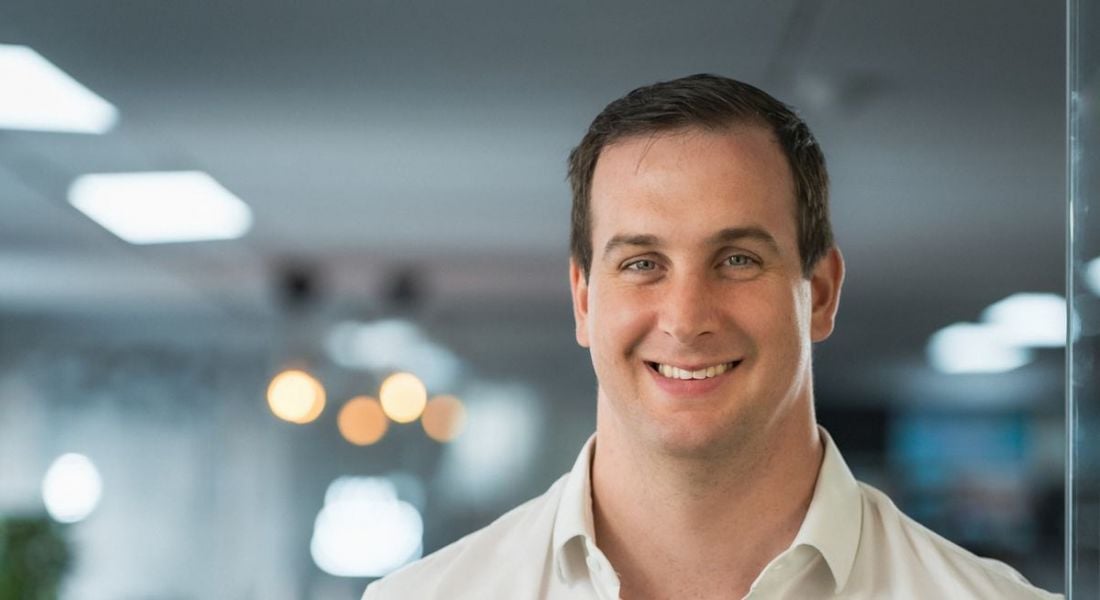Conor Magee traded in his butcher apron for an engineering apprenticeship. Now he is the CTO of Host Ireland Business Broadband.
After working for four years as a butcher in Fallon & Byrne, Conor Magee got the opportunity to make a big career change and pursue a lifelong interest in technology.
While he was always interested in the next big thing in tech as a child, a career in technology never occurred to him. Instead, he studied animal science in University College Dublin and went on to work as a butcher.
He then got an offer to join Host Ireland Business Broadband in 2012 as an apprentice engineer. Despite starting out as a complete novice, Magee is now chief technology officer of the company.
‘We’re only on the cusp of what can be achieved with new and emerging technologies’
– CONOR MAGEE
What brought you to your current role?
I wanted to join Host Ireland back in 2012 because there was this really exciting start-up energy in the company, which had its sights set on becoming the market leader in business-to-business connectivity in Dublin.
In that kind of environment, everyone has the opportunity to contribute and play a part in making the vision a reality. It’s really exciting for someone starting out and you’d be hard-pressed to get the same kind of experience with a big employer.
I’ve been able to contribute to its success and I’m proud of it but, after three years with Host Ireland, I decided I needed to see what a network looked like from the other side of the router. I headed to the UK to work in data integration as a professional services engineer.
I was in London for a little over two years and gained some fantastic experience. When it came time to return home, I knew Host Ireland was continuing to grow and challenge the market here.
I rejoined the company in 2017 as deputy chief technology officer – working mainly on bigger projects, including a major network investment underway at the time – and I was promoted to the role of chief technology officer in June 2021.
What were the biggest challenges you encountered on your career path?
As a career, network engineering has been very enjoyable and rewarding for me. You get to design, build and test a solution. When you hear that ‘ping’ and you know you’ve succeeded, you’re very happy.
There have naturally been some challenges as my career has progressed from technical to managerial. For one thing, there’s more pressure when you’re in charge and ultimately responsible for making sure a big project is delivered on time.
Learning to delegate has been enormously important for me. I’m naturally hands-on. I like to figure out how things work. That’s a big part of the reason network engineering suits me. Managing people and learning to delegate is different.
The important thing here is that, with time, experience and the right support, you can learn to do it. Once you have the hang of it, it’s incredibly rewarding because it’s really about empowering the people around you.
Was there any one person who was particularly influential as your career developed?
I can’t narrow it down to any one person. We have 16 people at Host Ireland but when I joined, there was a team of just seven. We all taught each other. We were all teachers.
Most of those early colleagues were still with the company when I came back after my stint in the UK and every one of them taught me something – how to interact with customers, for example, how to solve a challenging technical issue, or just simple commercial awareness.
It can be easy to forget that most of us spend the best part of our time at work. Working somewhere you want to work is so important. Having people with a shared vision, from whom you can learn, makes your days more enjoyable and rewarding.
What do you enjoy most about your job?
I love to help people and to solve problems, whether that be on the help desk or reviewing and improving the security policy for the company.
It’s really satisfying to be able to get to the crux of an issue, to reach the finish line on a project and be able to tick off an important task on your to-do list.
The best part about working where I am now is the shared nature of the work. We share our successes and achievements across the company. There are no silos. The drive and enthusiasm we have is great. It makes you want to do better; it makes you better at your job.
What aspects of your personality do you feel make you suited to this job?
I am a detail fanatic! I don’t think you could do my job without that. In network engineering, you really need to be able to zone in on a project, to focus and get stuck in.
You also need empathy – especially as a contractor – so you can understand your client’s requirements and the problems they need to solve.
Most of all, you need to be open to change. What worked yesterday may still do the job today, but is there a better solution?
There’s no better example than Covid of just how much things can change, how quickly they can change and how enduring that change can be. In network engineering, you have to be able to react quickly and, even better, keep ahead of the curve.
What can people expect from career progression in this industry?
Network engineering can provide an incredibly meaningful, progressive and long-term career. We’re only on the cusp of what can be achieved with new and emerging technologies. Progress can’t happen without the network engineers who make it happen.
I came into this profession as a novice, with nothing more than an interest in tech. Now, I lead the best network engineering team in the country.
The mass shift to remote working brought about by Covid has been a really disruptive force in the tech sector. People had to scramble really quickly to provide home-working solutions.
It’s at times like this that you see real innovation coming to the fore and some amazing companies commercialising new technologies that will have a lasting impact on how we live and work well into the future.
For people who are interested in network engineering as a career this creates opportunities, but I would always advise doing your homework before you agree to join any company in an apprenticeship role. You need to know that you’ll get the right kind of training and support.
To succeed in this career, you need a combination of real-world experience and the certificates to back it up. Certificates are brilliant to have on your CV. They allow you to progress, so definitely ask any potential employer about their training plan and know what you’re getting into before you take the job.
What advice would you give to those considering a career in this area?
There are so many different career opportunities in technology, and they are all really quite different. One of the most valuable experiences I’ve had in my own career has been working on our help desk, because of the insight it gave me.
It helped me to understand our clients as people and the problems they face, and that made me better able to solve those problems as a network engineer.
If you can solve people’s problems, you can make yourself indispensable very quickly. If you have a natural interest in technology, if you’re detail-oriented like me and you like to get stuck in and solve problems, a career in network engineering could be a great right option for you.
To succeed though, you have to want to keep learning, developing and challenging yourself. That’s as true for network engineering as for any career in technology, I think. You need to be able to keep pace because things are changing and evolving all the time, and at incredible speed.
Don’t miss out on the knowledge you need to succeed. Sign up for the Daily Brief, Silicon Republic’s digest of need-to-know sci-tech news.




